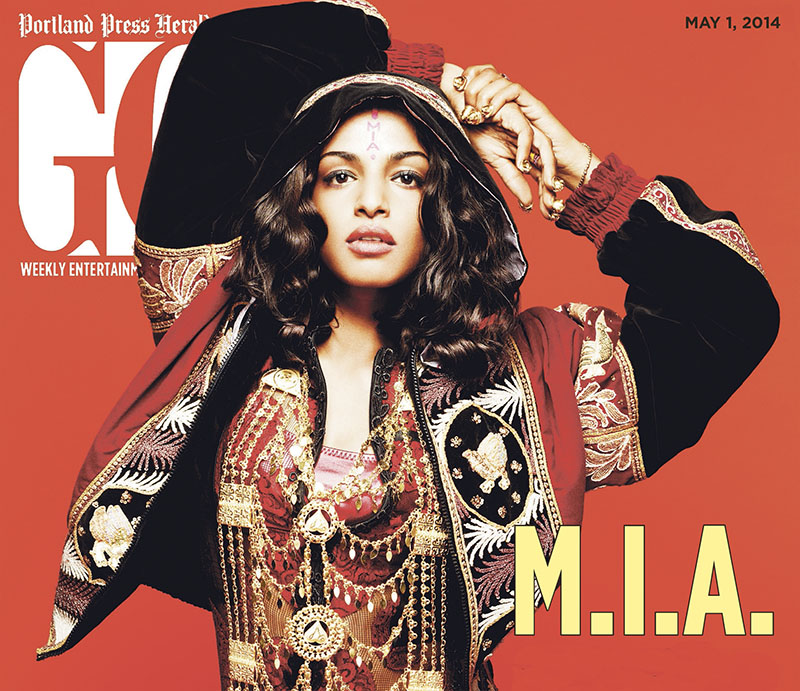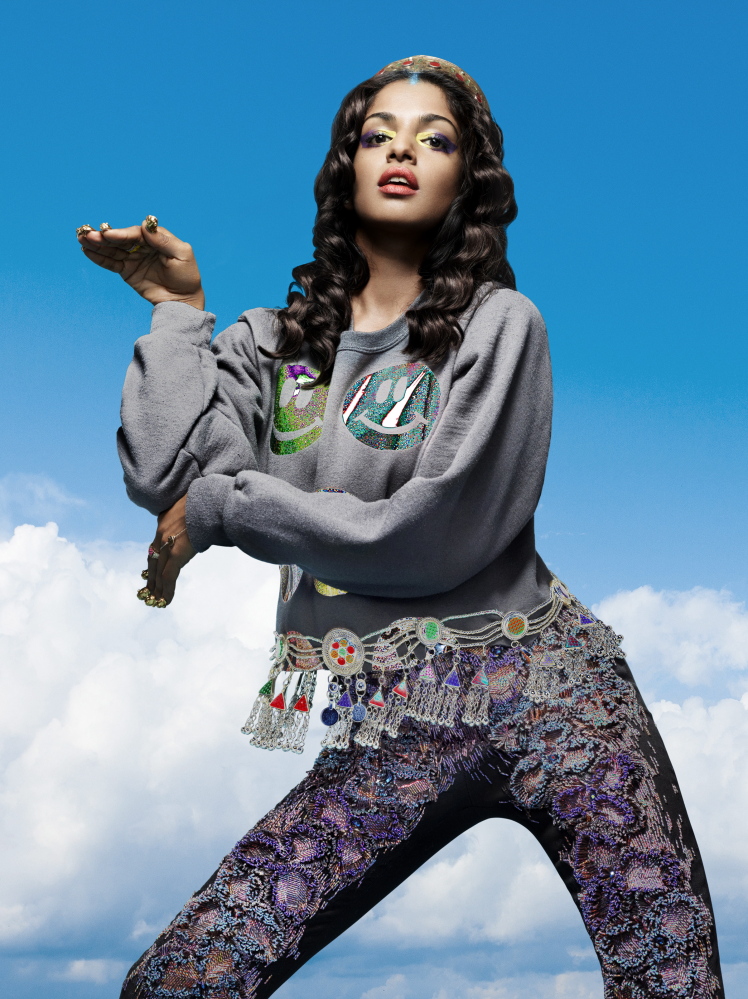Mathangi “Maya” Arulpragasam, better known as M.I.A., released her fourth record, “Matangi,” in November. She is playing her first show in Maine on Tuesday and the event, at the State Theatre in Portland, has sold out. For some, M.I.A. came onto the radar via her song “Paper Planes,” which was on the popular “Slumdog Millionaire” soundtrack of 2008. Two years ago she made headlines after flipping the bird during the televised Superbowl halftime show with Madonna and Nicki Minaj.
M.I.A., 38, spent the first part of her life in war-torn Sri Lanka, where personal safety was always in question. This resulted in her family moving to London when she was still a child.
Her debut album, “Arular,” was released in 2005, followed by “Kala” and “Maya” and then “Matangi.” She mixes her politically charged lyrics, drawing criticism for appearing to sympathize with a guerilla group from Sri Lanka, against electronic, hip-hop and world beats. At present, she resides in London with her 5-year-old son, Ikhyd.
This is a lightly edited transcript of our conversation.
Here in Maine we have many immigrants and refugees from Burundi, Somalia, Rwanda, Sudan, Bosnia, among other places. Given your own experiences, what would you say if you could interact with some of the these kids?
Everything you go through, it helps to shape who you are. Whatever makes you different helps you in the end. Whatever struggles or strife you have in trying to adapt it, adds to your thinking and what you become later on. If it’s embraced in a positive way, you can get something positive out of it.
You seem to be somebody who has so much going on. You’re a mother, a musician, a visual artist, you make videos, you do all this stuff. How do you balance it all?
Well, I think the act of balancing it all is the act of becoming an adult. When I was young it was quite a hard thing to do. If you come from a very disrupted family life then you tend to be sort of destructive. I felt like when I was younger my creativity was an outlet for the destructiveness of what I didn’t have balanced. And so I think becoming an adult is about that. I’m sort of trying to have fun with it because it’s something that I never had taught to me before. And my mum’s life was just so weird and it’s kind of unusual, that normalcy and balance and things like that. So I think just trying to do it and figuring out the things that make you feel good (achieves balance).
You’ve been touring for a number of years. What’s it like now on the road, and has it changed?
Well, I tour very sporadically now because of my child and I want to be there for him as much as possible. It has to be done within a certain framework. He’s at an age where I can’t just take him with me.
It seems like you are working all the time because you don’t have an on/off switch, which is true with many creative people.
I get that from my dad. I’m ‘on’ all the time. That’s the immigrant mentality, isn’t it? If somebody does one thing you have to do 10 things just to be on the same level or understood.
Is it overcompensating?
Yeah, I think that’s what it is. It’s definitely overcompensation that’s been taught to me from my mum. I’ve always had that since I was a child.
Is it a blessing and a curse?
It’s a combination of my dad being like that too. He’s a bit of a mad genius type. I think I have that bit of my dad combined with my mum and constantly needing to please people and just working 50 million hours. It’s double hard.
Your most recent album is named after the Hindu goddess Matangi, and it seems to have a definite spiritual bent. How did you decide to call it that?
I was actually making artwork and came across it (Matangi). But I used the music to try and understand what was going on and make an album that gave me time to explore it. What you have in my album is not a complete answer, but it’s more of an explanation of what came on the three albums before and what I was trying to work towards. People were like, ‘You’re crazy,’ or ‘What are you trying to do and what do you want?’ and ‘What are you after?’ and I didn’t have answers. But I felt like maybe the answer was there. I could come back and say, ‘Look, this doesn’t have to relate to you, this doesn’t have to apply to you, this doesn’t have to do anything but just let you know that you should follow your instincts and do a whole bunch of stuff.’ It just made a lot of sense to me at the time. It’s like your life is not suddenly gonna make more sense if you have more money or fame or success. It wasn’t about that. Your intuition and instincts and being true to who you are, those things are also rewarding in a different way. That’s kind of what I wanted to show.
This seems to be an important path for you to follow.
Yes, because the whole sort of coincidences, the whole Matangi story. It’s just so insane that you can dig into it and really get into it. My mum’s Christian and my dad’s Christian and my grandparents were Christians and only one of (my family) was a Hindu. It’s not like that was part of my lifestyle that I had access to. So it was just as weird for me and having become this sort of art school major, I was totally disconnected from a religious search kind of thing and that part of the community. I was just kind of an outcast in my culture, in the Sri Lankan community, so to access it on that level, it was interesting for me. It wasn’t because somebody took me to a yoga class and I met a guru. It happened through creativity, but it was a story of creativity itself that I couldn’t not know about that so it was about a goddess representing all forms of creativity. There are 64 different ones and it’s called Kala, which is the name of my mum, and my mum is kind of the person that I learned everything from that was creative and how to be good with your hands and make stuff. So that just made so much sense to me.
When did you make the connection between your name and the Hindu goddess?
We were making artwork in our hotel room and we had to deliver something to the printers in an hour and everybody was working really fast. There was about four of us in the room. We had to give a reference to the printer about what green we wanted to print and were just Googling and then one came up with parrot green in it and led to this link about goddess Matangi having a parrot. And she was green. So that’s when I found it and I was like, “Wow,” and the om sign is made up of the letter m, and it just happened at exactly the same moment.
That’s quite profound.
I know. And then I called my mum straight away and was like, ‘Did you know this is where my name comes from?’
Did she?
No, of course not. She said, ‘That’s a load of rubbish, that’s the worst thing I’ve ever heard.’ She hung up on me. She’s hardcore Christian. My mum goes to church five times a week and it’s born-again Christianity where they think any other religion is completely evil. For my mum (this discovery) was the worst thing. It’s quite funny.
Has she come around?
No, she just sort of deals with it like I’ve got the plague.
What about your dad?
Not really, we don’t really communicate.
What do you have in store for us when you come to Maine?
I made this set that kind of represents a temple in Kerola. I hope you like it.
Staff Writer Aimsel Ponti can be reached at 791-6455 or at:
aponti@pressherald.com
Send questions/comments to the editors.





Success. Please wait for the page to reload. If the page does not reload within 5 seconds, please refresh the page.
Enter your email and password to access comments.
Hi, to comment on stories you must . This profile is in addition to your subscription and website login.
Already have a commenting profile? .
Invalid username/password.
Please check your email to confirm and complete your registration.
Only subscribers are eligible to post comments. Please subscribe or login first for digital access. Here’s why.
Use the form below to reset your password. When you've submitted your account email, we will send an email with a reset code.